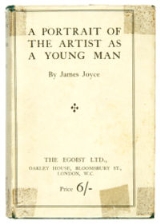
A Portrait of the Artist as a Young Man
A Portrait of the Artist as a Young Man (1916) is an autobiographical novel by James Joyce.
Sourced
- White roses and red roses: those were beautiful colours to think of. And the cards for the first and second place and third place were beautiful colours too: pink and cream and lavender. Lavender and cream and pink roses were beautiful to think of. Perhaps a wild rose might be like those colours and he remembered the song about the wild rose blossoms on the little green place. But you could not have a green rose. But perhaps somewhere in the world you could.
- Ch. 1
- — And thanks be to God, Johnny, said Mr Dedalus, that we lived so long and did so little harm.
— But did so much good, Simon, said the little old man gravely. Thanks be to God we lived so long and did so much good.
- Ch. 2
- To merge his life in the common tide of other lives was harder for him than any fasting or prayer, and it was his constant failure to do this to his own satisfaction which caused in his soul at last a sensation of spiritual dryness together with a growth of doubts and scruples.
- Ch. 4
- She was alone and still, gazing out to sea; and when she felt his presence and the worship of his eyes her eyes turned to him in quiet sufferance of his gaze, without shame or wantonness. Long, long she suffered his gaze and then quietly withdrew her eyes from his and bent them towards the stream, gently stirring the water with her foot hither and thither. The first faint noise of gently moving water broke the silence, low and faint and whispering, faint as the bells of sleep; hither and thither, hither and thither: and a faint flame trembled on her cheek.
- Ch. 4
- Her image had passed into his soul for ever and no word had broken the holy silence of his ecstasy. Her eyes had called him and his soul had leaped at the call. To live, to err, to fall, to triumph, to recreate life out of life! A wild angel had appeared to him, the angel of mortal youth and beauty, an envoy from the fair courts of life, to throw open before him in an instant of ecstasy the gates of all the ways of error and glory. On and on and on and on!
- Ch. 4
- It wounded him to think that he would never be but a shy guest at the feast of the world's culture.
- Ch. 5
- When the soul of a man is born in this country there are nets flung at it to hold it back from flight. You talk to me of nationality, language, religion. I shall try to fly by those nets.
- Ch. 5
- Ireland is the old sow that eats her farrow.
- Ch. 5
- Pity is the feeling which arrests the mind in the presence of whatsoever is grave and constant in human sufferings and unites it with the sufferer. Terror is the feeling which arrests the mind in the presence of whatsoever is grave and constant in human sufferings and unites it with the secret cause.
- Ch. 5
- The artist, like the God of the creation, remains within or behind or beyond or above his handiwork, invisible, refined out of existence, indifferent, paring his fingernails.
- Ch. 5
- His mind, emptied of theory and courage, lapsed back into a listless peace.
- Ch. 5
- It is a curious thing, do you know, Cranly said dispassionately, how your mind is supersaturated with the religion in which you say you disbelieve.
- Ch. 5
- Whatever else is unsure in this stinking dunghill of a world a mother's love is not.
- Ch. 5
- — Then, said Cranly, you do not intend to become a protestant?
— I said that I had lost the faith, Stephen answered, but not that I had lost self-respect. What kind of liberation would that be to forsake an absurdity which is logical and coherent and to embrace one which is illogical and incoherent?
- Ch. 5
- I will tell you what I will do and what I will not do. I will not serve that in which I no longer believe, whether it call itself my home, my fatherland, or my church: and I will try to express myself in some mode of life or art as freely as I can and as wholly as I can, using for my defence the only arms I allow myself to use — silence, exile and cunning.
- Ch. 5
- Welcome, O life! I go to encounter for the millionth time the reality of experience and to forge in the smithy of my soul the uncreated conscience of my race.
- Ch. 5
